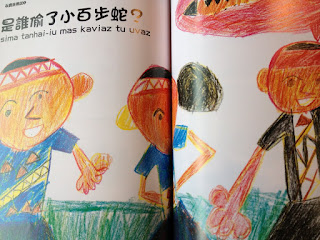When Wei Te-sheng (魏德聖), the director of Cape No. 7 and Seediq Bale, heard of a Chiayi high school baseball team that “almost” won the all-Japan Koshien summer tournament in Kobe in 1931, he just knew he had to make a movie about it. So he wrote a script, signed on as producer, asked Umin Boya to direct it, raised a pile of money, hired a cast of Taiwanese actors and extras, and the film, currently in production in Chiayi and other cities, is set to be released in early 2014.
The movie’s working title is “Kano,” the nickname of the old Chiayi Agricultural and Forestry Vocational High School, which no longer exists. The nickname comes from the first two English letters of the two Japanese words “Ka-gi No-rin,” with ‘Kagi’’ being the Japanese word for Chiayi and ‘’No-rin’’ being the Japanese term for agriculture and forestry.
“From time to time, Japanese tourists will stop here,” says Yu Guei-in (余佳蓁), a senior at National Chiayi University (NCYU), who works part-time as a secretary at the museum.
“Last summer, a Japanese reporter from the Sankei Shimbun newspaper came here to look around and ask us some questions about the movie, and three French tourists stopped by in August while visiting the city’s temples,” Yu says.
While most people in Chiayi know about the team’s exploits in 1931, few are aware that just a few steps from the modern 15-story glass-paneled city hall there is an old one-story Japanese-era building, hidden behind a long cement wall, that serves as an informal Kano museum for the team.
The building, still sporting sweet-smelling tatami mats and sliding paper doors in the Japanese style, houses the offices of the Kano Alumni Association. Supported by the city and a local university, it has a volunteer staff and is open Monday to Friday for tourists, scholars and history buffs. It’s a quiet place now, but once the movie is released, it could get crowded.
Inside the wooden structure, built in the 1920s, there is a library with dozens of copies of the Kano Alumni Association annual magazine, still published in Chinese by National Chiayi University (MCYU), and hundreds of old black-and-white photographs of the 1931 baseball squad. Outside in the courtyard there’s even a statue of one of the original team’s players holding up a bat and seemingly still ready to play ball.
Tourism opportunity
The Chiayi city government sees an opportunity in the 2014 release of the Wei-produced movie, which is said to be a cross between a baseball drama and a love story. Yes, Wei wrote a young woman into the script, and she’ll be the love interest of one of the players. So with expectations high that the movie will attract tourists from across Taiwan and Japan in the future, the city government’s tourism department donated a nice chunk of change — NT$500,000 — to help fund the movie.
Nearby, National Chung Cheng University, just a 30-minute bus ride from Chiayi, is planning to set up a tourist attraction based on the movie, since some of the action scenes will be filmed at Chung Cheng University.
According to Angel Chen (陳廷萱), a graduate student working on her master’s degree in marketing, the movie’s connection to Chiayi and Taiwan’s history during the Japanese Colonial Period (1895-1945) offers a “perfect storm” of public relations and tourism opportunities for all those involved in the movie’s production. [read more...]


